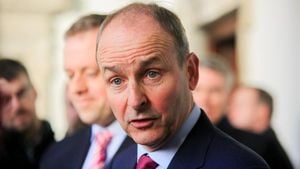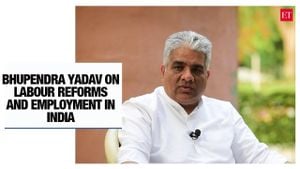The recent election has left many Americans reeling, particularly on the Democratic side, as Donald Trump once again assumes the White House. Experts and analysts are digging deep to unravel the reasons behind Trump's victory and what it could mean for the fabric of American democracy and its institutions.
Starting with the disheartening reality, Trump won less than half of the popular vote, yet somehow managed to claim victory across all seven swing states, forcing Democrats to reassess their approach to reach working-class and Latino voters. This has stirred up conversations about what Democrats must do to reframe their strategy, especially as they grapple with the ugly specter of raw racism and sexism, factors some argue doomed Kamala Harris's campaign.
A prominent voice amid this political turmoil is Rev. William J. Barber II, who has become one of the most ardent advocates for poor and working-class Americans. Barber has taken to organizing coalitions comprising working-class whites and people of color around issues such as raising the minimum wage and strengthening unions. He is known to many as "the closest person we have to Martin Luther King Jr." and leads the Poor People's Campaign, which aims for nationwide solutions to eradicate poverty.
Barber's past endeavors are especially relevant now; during his time leading the Moral Mondays movement, he helped bring together racially diverse coalitions to effect political change. His strategy involved flipping North Carolina from Republican stronghold to swing state and he aims to share this vision with Democrats still grappling with how to appeal to potential voters across lines of class and race.
According to Barber, the failure of both political parties to address the needs of the working class is glaring. CNN interviewed him about the results of the election, and Barber did not mince words about his concerns for the country's political future under Trump. His potent words, "I’m deeply concerned for this country. I’m deeply disappointed… he clearly doesn’t believe in the rule of law,” resonate with many voters worried about the future of democracy.
Barber also remarked on the shocking number of Americans who chose not to vote—30 million poor and low-wage individuals felt disconnected from the political process, claiming candidates failed to speak to their issues. He pointed to the presidential and vice-presidential debates where not once were discussions about policies addressing poverty and low wages raised. “Not one candidate was asked would they raise the minimum wage, which we’ve not raised for fifteen years,” he stated emphatically.
This sense of disenfranchisement among voters is echoed by others across the country. Many people feel politics is merely a game for the wealthy, leaving them out of valuable discussions around economic hardship and inequality. Rev. Barber’s call for “fusion politics” emphasizes the need for harmony among different races and classes, breaking the mold of two-party constraints and appealing to the shared interests of the broader population.
With Trump back at the helm, retail giants, including Walmart and Target, are poised for potential change. Analysts have identified major sectors—like tariffs and taxes—that could impact how these businesses operate. Some anticipate new tariffs could spike the costs of goods, negatively affecting consumer spending, which accounts for over two-thirds of the U.S. economy.
Experts highlight concerns about the tax framework Trump may pursue. Extending existing tax cuts could provide more disposable income for the middle class, potentially boosting retail spending. But here’s the kicker: any tax changes are unlikely to have swift effects. Industry insiders warn businesses need time to adjust, and spending habits may take months to reflect these changes.
Another hot-button issue is immigration policy which could also create challenges. Although studies suggest legal immigrants fill most of the retail jobs, concerns linger about how strict policies on immigration could adversely affect hiring and the overall functions of large retailers, particularly since many rely on tech workers with H-1B visas.
This brings us to the regulatory environment potentially awaiting these companies. Under Trump's leadership, experts predict the Federal Trade Commission, which has been cracking down on corporate price gouging, may shift toward accommodating business mergers more favorably. With anticipated changes to regulatory oversight, major mergers could find new partners, creating ripple effects across various sectors.
Looking at both the political and economic landscapes, Barber's insights paint a stark picture: without grassroots efforts from both voters and leaders, many may become complacent, potentially jeopardizing the future democratic framework of the nation amid these tumultuous times. His exhortation for renewed urgency to address the core issues haunting American society resonates loudly as his call for solidarity among the working class becomes more relevant than ever.
With the electoral outcome still fresh on everyone’s mind, the path to rehabilitating political engagement remains unclear. The overarching questions loom large—will Trump prioritize the same policies, or will he shift focus to appease his base? And, can the Democratic Party rise from the ashes to forge alliances with the very demographics Barber argues they need to engage?
The conclusion lies with time and the collective actions of citizens. The desire for lasting change can only ignite when the conversations spark at the grassroots level. Rev. Barber and many like him advocate for informed voters willing to stand together, pushing against systemic injustices to evolve American politics beyond the polarized rhetoric and onto solutions benefiting all.
Trump's second term not only symbolizes yet another chapter of America’s political saga but also presents an impending challenge for retailers, politicians, and the everyday citizen to reconsider their roles and actively engage with the future they wish to build.



